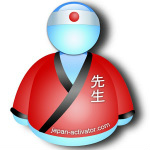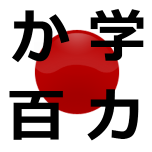Get Comfortable
Learn the language, learn the culture, learn to lose yourself in the crowd (sort of).
One of the first things you will need are some language skills. Don't panic, you don't have to be fluent. But learning doesn't have to involve an expensive class. Let's go over some options.
Smartphone apps. If you have a smartphone, apps are a great way to learn and study on your own. Lunch time, taking the bus to work, even bathroom breaks can turn into study time. And some good ones are free!

Just getting started? Hiragana Breaker is a fun way to memorize hiragana while learning the pronunciation. This game is made by our friend JohnSensei, and he is eager to get your feedback.

For Android users, JA Sensei is a great study tool. You can practice the hiragana/katakana/kanji flashcards, study and practice grammar, and expand your vocabulary. Get yourself started with the free version and then once you're comfortable, spring the ten measly dollars and get all the vocabulary you'll need for several vacations or business trips. It even has voice recognition so you can try speaking the language without embarrassing yourself!

Another popular Android app is Obenkyo (study). Doing much the same as JA Sensei but with a different format. No voice recognition, however. It's free, so give it a try and see which is more comfortable for you. Or try them both for a bit of variety.

Taking the JLPT? A fun app that helps you study vocabulary for the N5 level is Akira's KanjiN5. Using repetition that isn't repetitious, this trainer breaks the entire N5 level vocabulary into 18 groups. Memory is reinforced with images, kanji, hiragana, and listening practice. It's free, fun and it's effective!

Another fun and free (with in-app purchases) app for kanji study is Kanji Senpai. It gives you words verbally or written, and you supply the answers by multiple choice or writing them. It does a great job of keeping track of your progress, and eases you back into study if you take a break. Been using this one for a couple of years now, and can highly recommend it.
Browser translators. If you are using Mozilla's Firefox browser, the most popular in-browser translator is Rikaichan. Very handy and easy to use! If you're using Google Chrome, Google Translate is built into the browser. If you're using Windows Explorer, people will laugh at you.
YouTube channels. Videos are another great tool for self-study, and there are plenty of free ones on the internet. One of the best channels for Japanese students is by the Japanese Society of New York City (link). Another is JapanesePod101 (link), which also a great website outside of YouTube.

Facebook study. Joining a study group on Facebook is a great way to experience language and cultural exchange before leaving for your dream trip. Check out Japanese Study Club where you can ask questions about the lessons in either English or Japanese. They have quite a following!
Online quizzes. Once you start learning Japanese, you'll want to test yourself as soon and as often as possible. This helps with memory retention and gets you in the practice of thinking in Japanese. A great site with quizzes for different levels of Japanese skill is Nihongo-Pro. They have quizzes for kana, as well as quizzes for sentences to hone your skills with grammar and particles. They also have over fifteen native-language teachers so you can sign up for lessons.

Taking it to the next level: Japan as a career? Have you ever considered working in a Japanese-related field? Maybe for a Japanese company, or an American company in Japan? A local friend of mine is a former JET, holds a certified JLPT N1 proficiency rating, and has used 日本語 daily in his work for Japanese automotive manufacturers and even the Japanese government. He's started a new website call JohnSensei with the goal of helping people in their language studies, career advancement, and applying with the JET program. He keeps a schedule of anime conventions where he holds panels, so bookmark it and check back for updates. Alternatively, you can follow John on Facebook or Twitter.
In-person study groups. If you want to learn Japanese, you're probably not the only one in your area. Find them by looking for a meet-up group or a Facebook group. If you can't find one in your area, then start one! Reach out to your local Japanese community and see if a native speaker would like to help you or your group in an informal manner.
This will give you the chance to practice speaking and hearing Japanese. Plus, in a group environment, people can help each other out with their weaknesses. Some people have trouble memorizing vocabulary. Some have trouble hearing Japanese (when you're starting out, it can like a rapid rush of syllables). Some have trouble with pronunciations. Everybody has different strengths and weaknesses. Find or start a group, get a good chemistry going, and you'll be surprised how quickly you can learn.
The biggest challenge for study groups is usually finding a regular location to meet. Libraries often have meeting rooms that can be reserved for free. Or just grab a couple of tables at a nearby Starbucks. Maybe someone in the group will have a meeting room at their office. Be open to ideas.
This will give you the chance to practice speaking and hearing Japanese. Plus, in a group environment, people can help each other out with their weaknesses. Some people have trouble memorizing vocabulary. Some have trouble hearing Japanese (when you're starting out, it can like a rapid rush of syllables). Some have trouble with pronunciations. Everybody has different strengths and weaknesses. Find or start a group, get a good chemistry going, and you'll be surprised how quickly you can learn.
The biggest challenge for study groups is usually finding a regular location to meet. Libraries often have meeting rooms that can be reserved for free. Or just grab a couple of tables at a nearby Starbucks. Maybe someone in the group will have a meeting room at their office. Be open to ideas.

Formal classes. Yes, these cost money. But they can also be worth it. In Nashville, Tennessee, we're fortunate to have the Tennessee Foreign Language Institute. Using native speakers in an immersion environment, TFLI has a proven track record of success with an amazing range of languages. And since they're a non-profit, the prices are quite reasonable.

Make friends in person, in America. Your local Japan-America Society is a great place to make friends and learn about Japanese culture. They have everything from monthly 友達会 (friendship meetings) to 桜祭り (cherry blossom festivals) and more. There are societies in 26 states (plus Canada eh), so go make yourself some great new friends!
Copyright © 2014-2023 www.YouShouldVisitJapan.com
